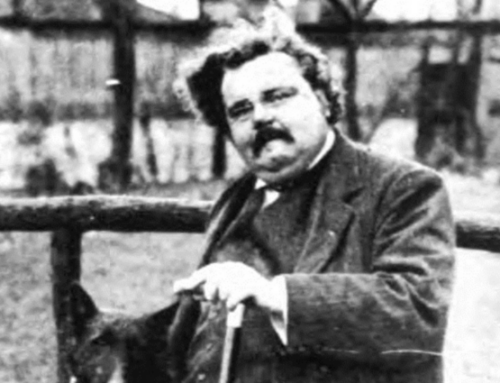
In a world that demands and encourages immediate reaction and instantaneous anger, serious writing allows us to turn toward the good, the true, and the beautiful in a meaningful manner, a manner worthy of our ancestors and of our children and grandchildren.
I’ve had the compulsion (yes, the correct word, I think) to write as far back as I can remember. As Winston Elliott and Steve Klugewicz (our faithful leaders of The Imaginative Conservative) have graciously allowed me to reminisce over the last several essays about loving words, books, and research, I thank them profoundly. It’s nice, healthy, and fascinating to take stock of one’s efforts, successes, and failures every once in a while without—here’s hoping—falling into some bizarre and subjective navel gazing. Some of what such taking stock reveals, though, is, perhaps, not quite as wonderful. I will freely admit that I have something akin to an addiction when it comes to writing. Still, as with all impulses and desires, I hope I have channeled them into something constructive. After all, if we ignore God’s “gifts,” we might as well slap Him in the face. If we misuse them, we might as well attempt to stab Him in the back.
As noted in the previous post, I have written something close to 1,000,000 words for internet essays over the past eight or so years. Some of these have been historical vignettes; some have been album reviews; and some have been bizarre and personal musings. Students often ask me how I can write so much. By what motivation? To what purpose? Using what tools? Thinking of which topics? As a professor, of course, I spend a considerable amount of my professional time teaching writing. I will freely admit, if I do it well at all, I do it far more by example than by explaining mechanics.
That admitted, though, there are some tools I reply upon, and I reply upon them with gratitude. I’ll do my best to list what I think critical for the successful (or, at least, obsessed!) writer. I think it’s critical never to skimp or cut costs when it comes to the tools you use. I could give you a rather Stoic reason as to why we should always support excellence in all things, but, for this post, I’ll mostly stick to those things I think necessary at a physical and material level.
To continue this point, you should own the finest keyboard you can afford. The trend over the last ten years has been toward minimalism. Though aesthetically pleasing, minimalism does terrible things to the fingers. Apple’s keyboards, especially, give no satisfaction to the fingers of a typist. Not only do they not allow for speed and travel, but they also frustrate the joints of the fingers. Would you ever run eight miles a day in bare feet? Of course not. But, for those of us who type, we subject our fingers and joints to the “asphalt” quite unprotected. Just as our Nikes cushion our feet, so a keyboard should cushion our fingers.
It’s not just health that matters, it’s also ability, speed, and coordination. Just as you would never expect to go to a concert to hear someone perform on some second or third-rate instruments, you would never expect a writer to use a cheap keyboard from Costco or Walmart. Just as a rock band needs the best equipment possible, so too does a writer.
My preferred keyboard when using my desktop or my laptop is the Das Keyboard 4 Professional for Mac. It’s my favorite, by far, and I can fly on it. It’s not quiet, but it is excellent. It’s also made for the person who spends much of her or his day typing, serving as the Nikes of the typing world.
Second, use good software and take the time to watch tutorials and learn the intricacies of the program itself. If you prefer to write linearly and in traditional fashion, you can use Microsoft Word or Apple Pages. Each is excellent, though I find Word a bit more intuitive than Pages. Of all the programs I’ve used over the years, WordPerfect was, by far, the most intuitive, especially for academic and footnote use, but the parent company unwisely stopped writing its office software for Mac years ago.
If you write much less traditionally (and you should consider doing so—tradition in this case means in a more mechanized, less creative and less humane fashion), you should invest in Scrivener (available for Mac and PC). The program serves not just as a word processor, but also as a data and research compiler. Its sidebar serves as an alternative finder, organizing your ideas as they come to you. When ready to complete the project, you can then readily move your ideas around like a giant puzzle, the pieces coming together to form a whole.
I also use a couple of software writing aids. The one I’ve been using since 1992 (in various and evolving fashion) is Endnote, a reference library that can create footnotes, endnotes, and bibliographies according to almost every imaginable format and format, such as Chicago, MLA, or Turabian (plus, about 400 others). I also really like software developed by a Minnesota-based company, Mariner. In particular, their MacJournal is perfect for . . . you guessed it, journaling!
Third, use a tangible—as in actual, physical books—dictionary and thesaurus. I realize that everything from the OED to Merriam-Webster is available online and in software versions for computers as well as tablets. These can serve as useful additions to one’s library, but I still need an actual dictionary and thesaurus for context and exploration. I’ve been using the same dictionary (American Heritage) and thesaurus (Roget) since college. Each is marked up rather fiercely and proudly.
Let’s go back to point one, keyboards. What kind of computer or tablet do you use? A PC, a Mac, an iPad, a Surface? Each, of course, has its advantages and disadvantages. With the emergence of cloud servicing, things are melding and syncing into one more quickly than anyone could have imagined even a decade ago. It’s worth considering the purchase of a writing instrument that is built for a single purpose. That is, something that doesn’t also allow the distractions of email, breaking news, web browsing, social media, and Civ VI. If you’re looking for the current equivalent of an IBM Selectric from 1983, check out Astrohaus’s Freewrite and forthcoming Freewrite Traveler. Astrohaus specializes in creating e-typewriters, keyboards with e-ink screens and one connection to the internet cloud. Focusing on the excellence of the typing experience, Astrohaus allows one to write game and social media free for hours and hours. It might be strange that we should pay for a return to 1983, but Astrohaus has done so very well.
Undoubtedly, writing can be a rather healthy addiction as well as an art. In a world that demands and encourages the immediate reaction and the instantaneous anger, serious writing allows us to turn toward the good, the true, and the beautiful in a meaningful manner, a manner worthy of our ancestors and of our children and grandchildren. Certainly, you could also write in long hand. But, if you want to go beyond long hand, don’t neglect the tools necessary to your craft.
The Imaginative Conservative applies the principle of appreciation to the discussion of culture and politics as we approach dialogue with magnanimity rather than with mere civility. Will you help us remain a refreshing oasis in the increasingly contentious arena of modern discourse? Please consider donating now.
Editor’s Note: The featured image is courtesy of Unsplash.







Thank you for this helpful article and all the tips! I’ve been storing my research on separate Word documents in files organized by topic. It can be cumbersome to find what I need. I thought I was so fortunate (compared to our parents or grandparents) to be able to keep my research notes this way, but Scrivener is what I need. It’s not very expensive either.
The tools of a trade are ever changing. My Father, a carpenter, had several hand saws he used for different jobs, rough cut, cabinet work, jigsaw, etc. The advent of power tools was a godsend, and he leapt on the opportunity of using them with a passion.
Not being a professional writer, my antiquated HP and Word system work all right for a weekend gardener. It’s not even up to the power of a five horse tiller.
But in my study, I have an old manual typewriter, with a keyboard much like the one in the illustration at top of your essay. Ever so often, I will glance it, or caress it, and recall fond days of yore, when at college, I had to retype an assignment several times due to my sloppy typing skills. Occasionally, I will even bang on it, am forcibly reminded of the amount of sheer force necessary to depress the keys, and wonder why I do not have arthritic fingers..
Then I return to my desktop electronic marvel, murmuring, “Thank God.”